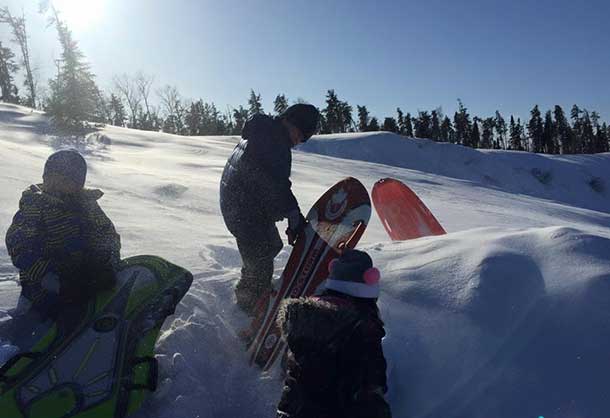by Xavier Kataquapit
There is a great deal of worry, fear and anxiety to Maachestan, the Cree word for “spring break up” on the James Bay coast. There are so many variables and chance events that can turn an average break up event into a disaster.
In my home community of Attawapiskat, we grew up with stories from our parents, grandparents and Elders who recalled spring flood events during their lifetimes. I remember sitting with my aunt Rose Kataquapit years ago in her small house in Attawapiskat. In the 1950s, she remembered one May spring breakup when the river ice had dammed in an unusual way and instead of water coming at them from the river side, the flood waters filled the forests around the community and water came at them in all directions. Aunt Rose explained how fearful, anxious and worried they all were as they hurriedly filled their canoes with their families and fled into the forest away from the moving river ice.
On May 16 1986, the worst spring flooding event occurred in the old village of Winisk on the Hudson Bay coast north of Attawapiskat. Two people died in this terrible event and an entire community was destroyed and was later rebuilt as the modern settlement of Peawanuck.
I remember several spring break up events when I was a young boy in the 1980s. It all depended on the weather and how fast or slow the ice and snow melted. If the weather was consistently warm, then it was fairly predictable but if the weather constantly changed from warm to cold over weeks, then there was no way to know what would happen. I remember monitoring the breaking ice with everyone on the river bank as Elders and traditional people did their best to read the conditions. There was a lot of anxiety at night as anything could happen at any time. Big freighter canoes were positioned upright next to our front doors, ready with paddles and some emergency supplies.
There were some nights that our parents warned us to prepare to move if anything happened and we went to bed listening to the booming sounds of massive blocks of ice tumbling onto themselves in the dark. It was frightfully anxious to listen late a night to the movement of the river. It was contrary to what you would expect. It was good to hear the crackling of brittle ice crystals, the loud static sound of sharp ice rubbing against themselves and the crash of heavy blocks because it meant the ice was moving. If the sound stopped, it meant the ice had dammed and it was a matter of waiting for the water to rise. Silence in the dark meant that we were in danger.
The dangers of the annual spring break up is no different today. Thanks to the work of our leadership and knowledgeable traditional people who have a good understanding of the river and ice movements we have a better idea these days of the threat of flooding. These Elders and traditional people fly in helicopters and aircraft along the river and water systems to monitor the situations for our community members. I was happy to see traditional people like Joe Louttit taking a prominent role in monitoring the ice. His father Reg Louttit, who was a memorable Chief in our community in the 1980s, had done the same with so many Elders in the past. Meegwetch for everyone involved in keeping family and friends safe.
There are evacuations that take place with the threat of potential flooding and often the most vulnerable are the first to be flown south to be safe. Many prefer to escape to their traditional territories and camps where they know how to be safe from flooding. However, many others are not able to travel on the land and it is safer for them to go south.
As much as I worry about flooding risk for people I also am very concerned for those who go south where there are so many possible dangers. People end up driving on busy highways and some fall into using alcohol and drugs or associating with dangerous people. I worry about our Elders, young people and family and friends who end up transplanted in cities and towns to the south.
Leadership and coordinators have become experienced in these dangers and every year they take more and more efforts to keep everyone safe. I know that our leadership, volunteers in southern communities and organizations do a lot to make sure people are cared for and made comfortable during every evacuation.
So I wish everyone a safe and careful evacuation during the spring breakup and I hope and pray that severe flooding does not take place. Yes, I worry a lot and there is good reason. I will be more content when everyone manages to return to their homes and the danger of flooding passes with no harsh or tragic consequences. Please stay safe everyone.







